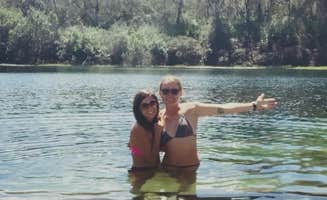Dispersed camping near Port Orange, Florida primarily concentrates in Ocala National Forest, located within a one-hour drive from the city. The forest encompasses over 387,000 acres of diverse terrain including sand pine scrub, longleaf pine, and cypress swamps with elevations ranging from 40-100 feet above sea level. Summer temperatures frequently exceed 90°F with high humidity, while winter nights can occasionally drop below freezing, requiring appropriate seasonal preparation for primitive camping.
What to do
**Swimming and fishing: At Freak Creek Dispersed Camping, visitors can enjoy natural water features. "There is a nice creek area where you can swim and or fish if you have the right equipment to get back there it can be fun," notes reviewer hilary G., who emphasizes the need for proper vehicle access.
Wildlife observation: The remote nature of these sites provides opportunities for wildlife viewing. One camper at Freak Creek Dispersed Camping mentioned, "I talked to another person that use to go out there and said she has seen a panther." Wildlife sightings require patience and quiet observation.
Paddling access: Several dispersed sites provide launch points for kayaks and canoes. "Great place to put a kayak in the water," reports Adamm A. about Freak Creek. Water levels fluctuate seasonally, with spring typically offering optimal paddling conditions.
What campers like
Night sky viewing: The limited light pollution in remote areas provides exceptional stargazing opportunities. One visitor at Blue Sink described it as the "Most beautiful place to stumble upon," highlighting the natural beauty that rewards those who make the effort to reach these locations.
Privacy and solitude: The challenging access helps maintain the remote character of these sites. Adamm A. describes Freak Creek as "super secluded and quiet," noting that "depending when you stay there's at times people who show up to party and then leave." Weekdays typically offer the most solitude.
Primitive camping experience: These locations provide genuine backcountry conditions without developed amenities. The lack of facilities at St. Johns River Dispersed Spot creates an authentic wilderness experience that appeals to self-sufficient campers prepared for primitive conditions.
What you should know
Vehicle requirements: Many dispersed sites require specialized vehicles with appropriate clearance and capabilities. According to hilary G., "If you don't have 4wd and recovery gear I wouldn't risk it" when accessing Freak Creek. Sand traps, water crossings, and rutted roads present serious challenges even for capable vehicles.
Access limitations: Forest management practices can affect site accessibility. At Blue Sink, Destiny R. notes "You may need ATV or creative backpacking to get there now. The Forestry Service recently chopped down trees and covered the easy access roads."
Security concerns: Some areas have reported safety issues that warrant consideration. A reviewer at Lake Dorr reported, "Spoke to a local that warned of violence, robbery, and killings in this area of the national forest," indicating significant safety concerns in certain forest sections.
Tips for camping with families
Site selection: Families should carefully evaluate access and safety concerns before committing to remote locations. At Freak Creek, Adamm A. advises, "I would not attempt bringing a camper unless it's really small," suggesting tent camping might be more practical for family groups.
Recovery planning: Given the challenging terrain, families should prepare for potential vehicle issues. One Lake Dorr visitor reported, "Got stuck in sand on the way out and had to wait for a tow truck," underscoring the importance of recovery equipment or establishing communication plans.
Road navigation: When exploring with family, carefully research current forest road conditions. For Lake Dorr specifically, Michael S. advises visitors to "avoid north part of Ron Paul Drive. You'll either get stuck in sand or have issues to low/tight trees. Drive further south of the other side of Ron Paul Drive."
Tips from RVers
Vehicle size restrictions: RV access is severely limited at most dispersed sites near Port Orange. At South Tower Hunt Camp, forest roads typically require high-clearance vehicles and aren't suitable for larger recreational vehicles or travel trailers.
Alternative options: RVers seeking dispersed camping near Port Orange may need to consider improved forest service roads or hunt camps during off-season periods when site conditions allow safer passage for larger vehicles.


